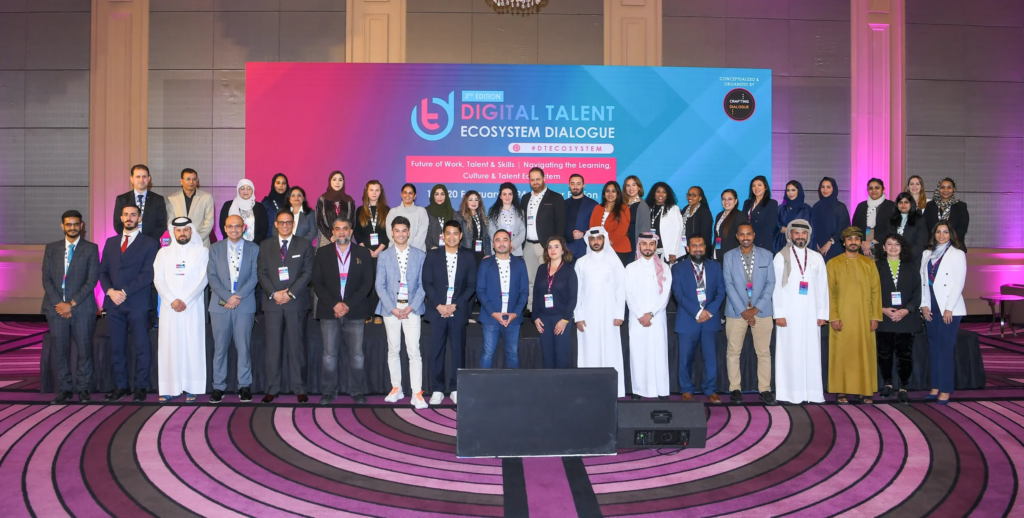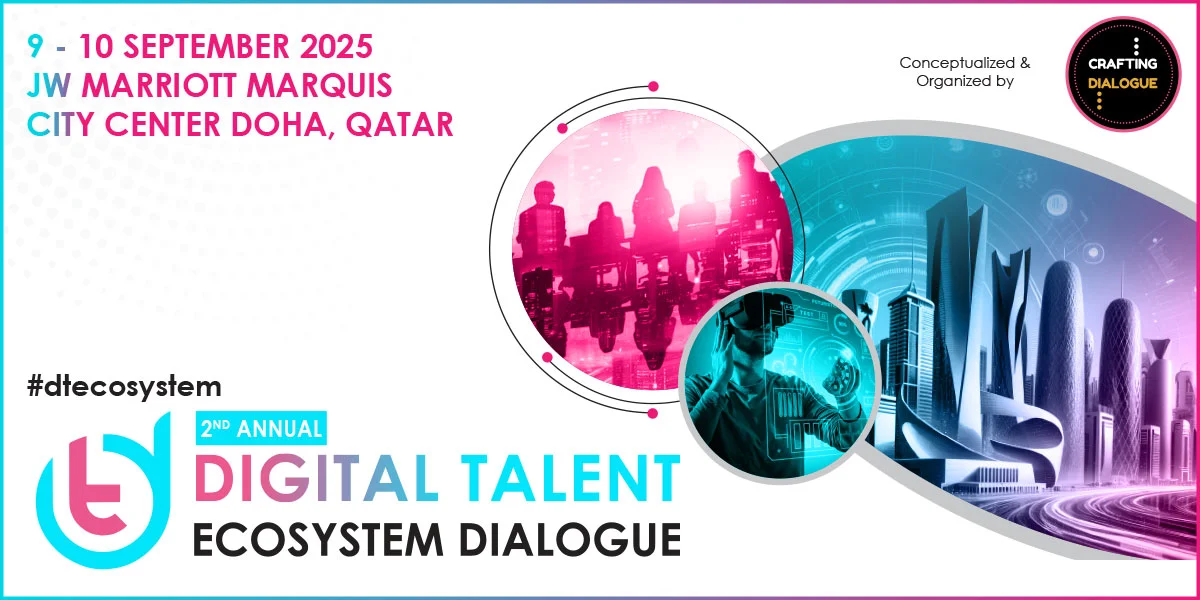The 2nd Annual Digital Talent Ecosystem Dialogue held in Doha recently marked another important milestone in Qatar’s journey toward achieving its Vision 2030. This event, hosted by the Ministry of Communications and Information Technology (MCIT), brought together policymakers, tech industry leaders, HR specialists, and educators to discuss the evolving digital workforce landscape in Qatar. The primary goal? To map out practical solutions that align with Qatar National Vision 2030’s pillars of human development and a knowledge-based economy.
This year’s theme, “Building the Digital Future,” emphasised collaboration, innovation, and investment in human capital. With over 500 delegates attending from the region and abroad, the dialogue was a beacon of Qatar’s ambition to become a regional hub for digital talent and innovation.
Qatar Vision 2030 and the Digital Workforce
Qatar National Vision 2030 focuses on four key pillars: Human Development, Economic Development, Social Development, and Environmental Development. Among them, human development plays a crucial role, and this is where the Digital Talent Ecosystem Qatar initiative fits in.
With the rise of AI, cyber security, and data science, Qatar recognises that its people need to be equipped with the right digital skills. The Digital Talent Ecosystem Dialogue serves as a dynamic platform to ensure that the country’s workforce remains competitive, skilled, and future-ready.

A Strong Focus on Nationalization and Inclusion
One of the dialogue’s key highlights was its emphasis on developing local talent. The MCIT reaffirmed its commitment to supporting Qatari youth, women, and underrepresented groups in the digital workforce.
Minister of Communications and Information Technology, Mohammed bin Ali Al Mannai, stated, “Investing in our people is not just a goal; it is a necessity. We are laying down a strong foundation for future generations to thrive in a smart, knowledge-based economy.”
By creating policies that encourage participation from all sectors of society, the Digital Talent Ecosystem Qatar is ensuring that no talent goes unnoticed or underutilised.
Collaborations With Global Tech Giants
Tech giants such as Microsoft, Google Cloud, Oracle, and SAP participated in the event, offering insights into global trends and how Qatar can align its strategies with international standards.
Microsoft Gulf’s regional manager emphasized the importance of certification programs and micro-credentialing, pointing out that over 60% of the future jobs will require mid-level digital skills. These tech companies committed to scaling up their training programs in partnership with Qatari universities and government initiatives.
Such partnerships are key to enabling a sustainable Digital Talent Ecosystem Qatar that’s globally competitive.
Innovation Labs and University Partnerships
The dialogue also highlighted successful partnerships between universities and the private sector. Institutions such as Qatar University, Hamad Bin Khalifa University, and CMU-Q presented new digital curriculum initiatives and incubation programs for young innovators.
One standout initiative was the Digital Innovators Lab, where students can work on real-world projects alongside industry professionals. These programs aim to bridge the gap between academic knowledge and industry requirements, a vital step toward building a resilient and adaptable workforce.

Skills of the Future: What Qatar is Prioritizing
During breakout sessions and panel discussions, experts identified the top 5 in-demand digital skills for the next decade:
- Artificial Intelligence (AI)
- Cloud Computing
- Cybersecurity
- Data Analytics
- Software Development
The Digital Talent Ecosystem Qatar program is integrating these skills into national education frameworks and workforce training programs. Participants agreed that ups killing and res killing are no longer optional they are essential for national growth.
Smart Policies Driving the Ecosystem Forward
Qatar is also implementing pro-digital talent policies to accelerate growth. These include:
- Tax incentives for tech startups
- Visa facilitation for foreign tech workers
- Funding for STEM education programs
- Mandating digital certifications in public sector hiring
By aligning policy and education, the Digital Talent Ecosystem Qatar is on track to create over 100,000 digital-related jobs by 2030.
Startups and Youth Empowerment
The dialogue provided a platform for Qatari startups to showcase their work in AI, fintech, and cyber securit. Several youth-led ventures were recognised for innovative solutions to local challenges, from smart city applications to AI-based healthcare systems.
Young entrepreneurs spoke about the need for more mentorship programs, seed funding, and international exposure, all of which are being addressed through various new ecosystem initiatives.
Challenges Ahead: Bridging the Digital Divide
Despite significant progress, Qatar still faces challenges, including:
- Limited awareness in rural areas about digital careers
- Mismatch between graduates’ skills and job market needs
- Retention of digital talent in the private sector
The MCIT and education authorities are working to bridge the digital divide through awareness campaigns, mobile tech labs, and internship opportunities in both government and private sectors.
Voices from the Dialogue: What Participants Said
Here’s what a few key participants had to say:
Fatima Al-Kuwari, Head of Talent at a Qatari Tech Firm:
“We see this dialogue as a mirror reflecting where we are and where we want to go. It’s about more than just tech it’s about people.”
Dr. Rajiv Menon, Academic Dean at CMU-Q:
“The integration between academia and industry must be seamless. Students need to graduate ready to contribute from day one.”
Omar Khaled, CEO of a Qatari AI Startup:
“These platforms help us connect with government decision-makers and global investors. It’s the fuel startups need to thrive.”
Conclusion: Toward a Digitally Empowered Qatar
The 2nd Annual Digital Talent Ecosystem Dialogue proved that Qatar is serious about becoming a global digital leader. By bringing together government, academia, tech giants, and startups, the event forged new paths toward a digitally empowered society.
As Qatar Vision 2030 approaches, it’s evident that investing in digital talent is the key to long-term national success. The dialogue served not only as a forum for collaboration but also as a launchpad for innovative strategies that ensure Qatar’s leadership in the digital economy.
With ongoing commitment, smart policy, and inclusive frameworks, the Digital Talent Ecosystem Qatar will continue to grow stronger each year, playing a vital role in shaping the country’s prosperous future.
Do follow Gulf Magazine on Instagram
Also Read – MoEHE Orientation for Scholarship Students: 5 Positive Outcomes



